

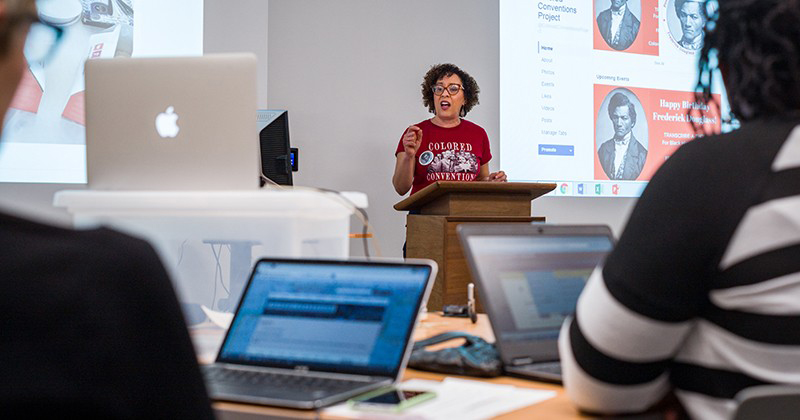
Mellon Foundation grant
Photos by Kathy F. Atkinson, Evan Krape and courtesy of Jim Casey April 24, 2018
Award to support Colored Conventions Project initiatives
The University of Delaware has received a $200,000 grant from The Andrew W. Mellon Foundation, supporting the public-humanities Colored Conventions Project (CCP) as it continues to expand its nationwide collaborations.
CCP is an award-winning interdisciplinary project that brings decades of early African American organizing for legal, educational and labor justice to digital life.
From 1830 until the 1890s, already free and once captive African Americans came together in state and national political meetings called "Colored Conventions." Founded and hosted at UD, the CCP identifies and transcribes hundreds of proceedings from the little-known Colored Convention movement, making these rare documents readily accessible to scholars and the public for the first time.
The new, three-year Mellon Foundation grant will allow the project to expand in multiple directions, said P. Gabrielle Foreman, CCP’s founding faculty director and UD’s Ned B. Allen Professor of English and professor of history and Africana studies.
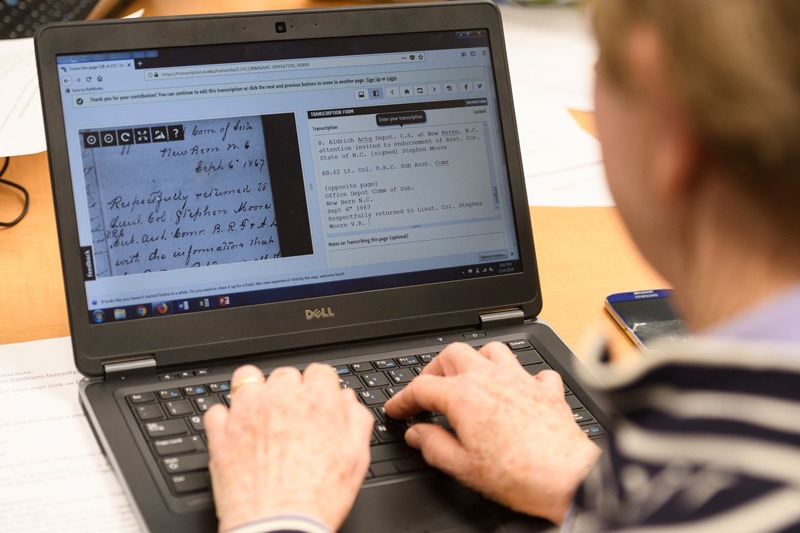
“The Colored Conventions Project has benefited enormously from the collaborations and partnerships we have and from the support that we’ve been offered from so many sources, including our teaching partners, libraries and archives, and from community and independent scholars,” Foreman said.
“We could not be happier than to be in the important and select company of the projects that the Mellon Foundation generously funds.”
The project, at ColoredConventions.org, works to transform teaching and learning about the historic collective organizing effort and about the many leaders and places involved in it. By making the conventions’ records available in one online site, documents that were once almost impossible to locate become accessible to anyone interested in the history of activist church, civil rights, educational and entrepreneurial engagement.
Thousands of scholars, teachers, students and community “volunpeers” around the country have contributed to the project by transcribing minutes for entry into the digital archive.
With the support of the Mellon Foundation grant, the project plans to expand its geographic reach, adding records to its database from a wider range of locations where conventions were held.
“We now have funding for satellite programs to read and collect records from places where we haven’t worked before,” Foreman said. “We’re seeking to develop the best partnerships with libraries and archives and universities in various states to expand the convention records, to make those records accessible and to connect them to contemporary social justice movements.”
The Colored Conventions took place in many locations—some were national gatherings, while others were statewide—and the project aims to collect and transcribe as many as possible, said Jim Casey, a co-principal investigator on the Mellon Grant and national co-director of CCP, who earned his doctorate at UD in 2017.
“The history of the Colored Conventions is so broad and so spread out that we couldn’t possibly do all this from the University of Delaware,” Casey said. “We’ve looked at Philadelphia, New York, Boston … but there were communities all across the United States organizing conventions.”
While developing the geographic expansion, leaders of the project are also continuing a focus on the Philadelphia region, where many of the earliest conventions took place, including the very first at Philadelphia’s Mother Bethel AME Church in 1830.
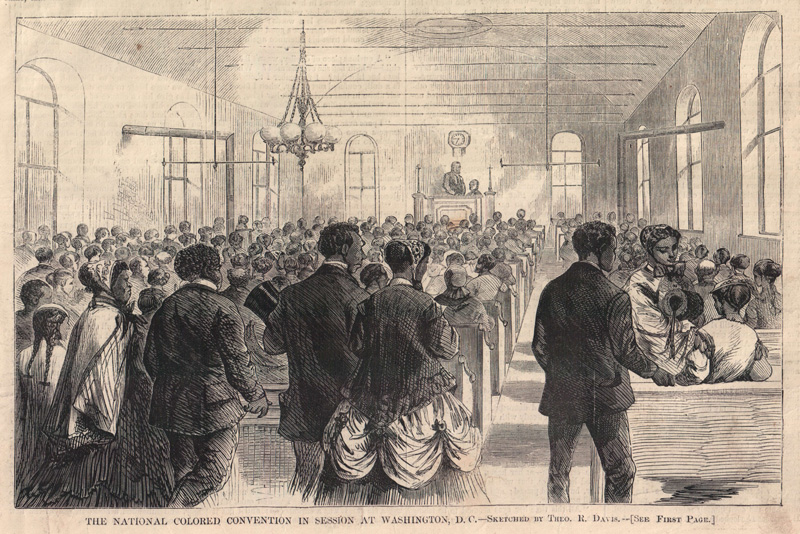
The hope, Foreman said, is that Philadelphia and the Delmarva area will form a core mid-Atlantic hub for the project, working with new satellite partners in the Midwest and elsewhere.
Other initiatives being planned with support from the new grant include outreach efforts to increasingly “put history into public view,” Foreman said, and to enhance opportunities for the project to work with visual and creative artists by attracting new Mellon-funded “arts fellows.”
A new low-residency summer program will bring a media specialist in digital humanities to UD this year to work with the CCP team and the community.
“By bringing specialists to campus, we want to share leadership opportunities and also bring visibility to what we’re doing here,” Casey said. “They can teach us things, and also learn from us.”
The CCP began in 2012 with an assignment Foreman gave to one of her graduate classes, asking each student to choose a delegate from the convention they were reading and create an online profile that included historic images and data visualization. Students and librarians continued as project leaders, adding digital exhibits, a robust curriculum and transcription options on the website that became the Colored Conventions Project.
In the years since, the project has partnered with the UD Library on several initiatives and has reached thousands of students across the country who engage in original research through CCP’s national teaching partners.
"The Colored Conventions Project has provided our students and hundreds of others at schools across the country a wonderful opportunity to engage with historical materials both in Special Collections and in Library-supported databases,” said Carol A. Rudisell, a librarian in the Reference and Instructional Services Department of UD’s Library, Museums and Press, who works with CCP. She noted that “transcribe-a-thons” to mark Frederick Douglass Day have been held at Morris Library, opening its doors to people who have historically felt excluded from campus.
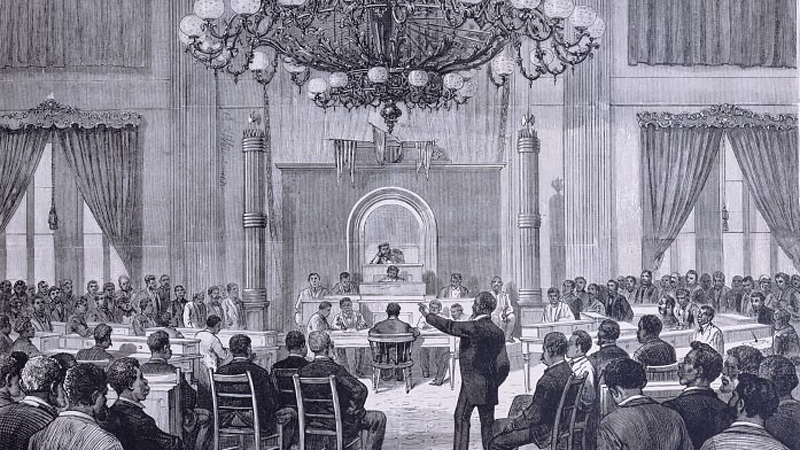
“Support from the Mellon Foundation should further the growth of black public humanities and digital scholarship, and the library is very happy to collaborate with the CCP on this new project," Rudisell said.
CCP has been honored by the National Endowment for the Humanities, which named it one of the 50 “essential” projects the agency has supported, the American Studies Association and the Modern Language Association, which awarded CCP its Prize for a Bibliography, Archive or Digital Project.
The generous support from the Mellon Foundation is “a wonderful endorsement of the important work” the project accomplishes, said Lauren Petersen, interim associate dean for the humanities in the College of Arts and Sciences.
“This interdisciplinary project is highly collaborative—with partners both within the University and across the nation—and serves as a model for the public humanities as it bridges rigorous archival research, teaching in the classroom and community building outside the classroom,” Petersen said. “The University of Delaware extends its gratitude to the Mellon Foundation.”
The University of Delaware and the CCP
In addition to providing important historical resources to scholars and the community, CCP has offered highly valuable opportunities to UD’s undergraduate and graduate students.
“We’re gratified to have so much support at the University of Delaware from the College of Arts and Sciences, the UD Library, the Interdisciplinary Humanities Research Center and others,” Foreman said. “We are particularly gratified by the success of the graduate and undergraduate students who have been associated with the project.”
Casey and Sarah Lynn Patterson, for example, both worked with CCP from the start as graduate students and remain involved as national co-directors today. With Foreman, they are co-editing the forthcoming volume, Colored Conventions in the Nineteenth Century and the Digital Age.
Patterson now teaches African American literature at the University of Massachusetts Amherst. Casey is a postdoctoral research associate at the Center for Digital Humanities and Perkins Fellow in the Humanities Council at Princeton University.
Other former students who worked with CCP are enrolled in doctoral programs or are working in fields ranging from English and art to computer science and biomechanics. Undergraduates in such majors as public policy, history, German, international business and psychology have been integral parts of the CCP team.
“We have former graduate students who are now at some of the best institutions in the country, and we have former undergraduates who have gone on to law schools and professional schools in a variety of disciplines,” Foreman said. “We’re pleased that the Colored Conventions Project has been a launching pad for these terrific students.”
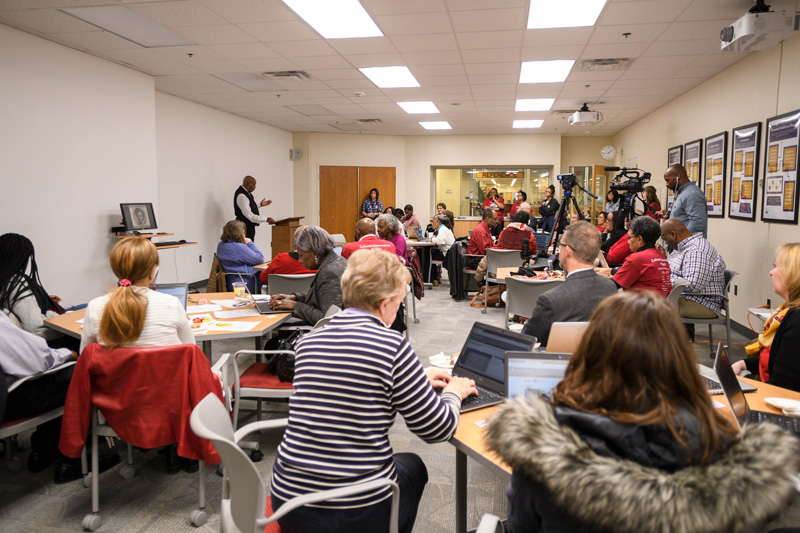
Contact Us
Have a UDaily story idea?
Contact us at ocm@udel.edu
Members of the press
Contact us at 302-831-NEWS or visit the Media Relations website

